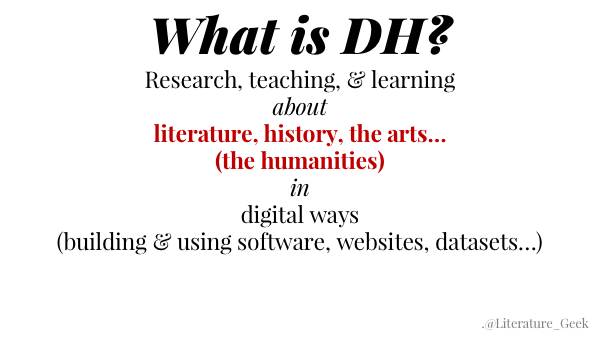Exactly a week ago, I had my own ideas and stereotypes regarding the idea of Digital Humanities. It was somewhere in between my consciousness and subconsciousness. I was sure that I could uphold DH values, however, it was the moment that I did not have clearly established and defined to myself what those values actually were. The idea, which I loved even before reexploring DH independently and profoundly, was accessibility. I believe DH aims to reach out diverse and wide audience despite their expertise. At the same time, the language for the DH project should be inclusive and welcoming. Since last Monday my fenced box for DH definition has been expanding and I have been enjoying the interdisciplinary humanism of it and the collaborative and friendly spirits of people involved in DH.
Last week we had to brainstorm and define three concepts: digital, humanities, and then DH values. I realized that I had a hard time defining digital by itself because of the discourse of our fellowship. I also struggled to define humanities, because I don’t think it has a vivid border anymore. However, in terms of DH, my mind had the most freedom to get creative and excited. And I acknowledged this is the main reason why I want to be a part of the DH world because it advocates unlimited creativity and freedom within its values.
Then I read “This Is Why We Fight”: Defining the Values of the Digital Humanities“ by Lisa Spiro, who beautifully describes and evaluates the following DH values: Openness, Collaboration, Collegiality and Connectedness, Diversity, Experimentation. Her definition of each well-known concept started triggering excitement in my mind for perceiving the beautiful nature of DH. I especially enjoyed accenting the relationship part of this field. How much DH values healthy, supporting, and open relationships in order to achieve a goal. She introduces the idea of a non-hierarchical community where each contributor’s expertise is fully acknowledged and respected, but yet the community by itself is non-hierarchical with its nature. Another highlight for me was the importance of experimentation and even failure in the process of building something new in the DH world. I think curiosity toward a challenge is very often a wonderful pathway of creating something that is going to be innovative. And the failure of this challenge for the first attempt only shows the courage of the initiators to take something risky and trust their curiosity. As Lisa Spiro reinforces failure becomes a wonderful lesson for the DH community for the future successful final product.
Amanda Visconti in her talk Digital Humanities: What? Why? How goes more in-depth analyzing different questions around the DH. She emphasizes what she believes is DH, what it is not, how much creativity and originality is required in DH, whether people involved in DH automatically become scholars, and does even titles in DH matter. I really enjoyed how much she cherishes the interdisciplinary nature of DH. At the same time, the diversity of skills and professionalism is equally crucial for creating a DH product. She also emphasizes the significance of the desire to learn and I think this is the key attraction to her argument for me. I believe in our reality as we are all surrounded by unlimited information and opportunities the definition of professionalism for me becomes having the ethical capacity to ask questions and project the urgency of lifelong learning. In the DH community, one person can be an expert in their own professional field and a beginner in a tool or a field that can be taught by the other community member. And the beauty of the community is the eagerness to share each other’s expertise for creating something challenging and innovative but accessible to a wider audience.
I really enjoyed the blog essay Amanda Visconti included that describes the transparent border between service and scholarship. It opened up new thoughts and ideas to myself and I would encourage anyone, especially people like me who are stepping their first steps in DH to read this wonderful essay by Mark Sample.
It has been only a week since the fellowship has started and during the wonderful sessions with the amazing cohort of our library and guest speakers and all their provided materials have been expanding the definition of DH. What I have been enjoying the most is the role of humanism and interdisciplinarity in DH.
I am very excited and lucky to have this opportunity to keep pushing my ideas, opinions, abilities, stereotypes, boundaries, and definitions with our wonderful team.
Written by Ana Vashakmadze ’22, Student at the Sunderman Conservatory, Gettysburg College, part of the DSSF Summer ’21 wonderful Cohort.

